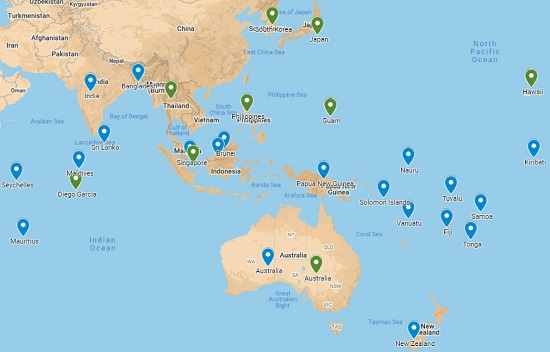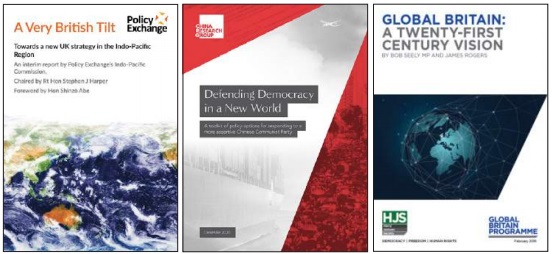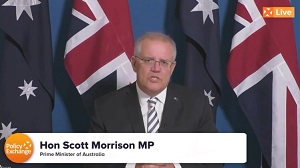A flurry of new reports herald an expansion of British influence over the recently rebranded “Indo-Pacific region” (IPR), to block nations copying the Chinese approach to development—which as per 23 November announcements has lifted every Chinese county out of extreme poverty. Of course, that is not acknowledged by the reports: they continue to demonise China, proffering a “solution” which amounts to the outright revival of naked imperialism.

The reports offer an insight into why US foreign policy, whether Republican- or Democrat-drafted, is focused on the fastest growing region of the world in close coordination with the United Kingdom. The British government backed President Barack Obama when he launched his 2011 Asia Pivot, in keeping with UK’s “special relationship” strategy expressed as “British brains—American brawn”. While President Donald Trump complicated matters by pulling out of the economic adjunct of the Pivot, the Trans-Pacific Partnership (TPP) trade deal, the rebalance to Asia moved ahead significantly under the guiding hand of Secretary of State Mike Pompeo. Pompeo’s proposed “alliance of democracies” to counter China is the flavour of choice for the strategy provided in the new reports, and is designed to lock in the policy course of the new US government.
If China didn’t feel ganged-up on before, it certainly will after studying these reports. They include:
- “A very British tilt: Towards a new UK strategy in the Indo-Pacific region”, produced by the British right-wing think tank, Policy Exchange. Former Australian Foreign Minister and High Commissioner to the UK, Alexander Downer, is chairman of Policy Exchange and one of the commissioners responsible for the report, along with former Canadian Prime Minister Stephen Harper; former director of British intelligence agency Government Communications Headquarters, Robert Hannigan; former Secretary General of NATO, Lord George Robertson; and Nadia Schadlow, former US deputy national security adviser and primary author of the December 2017 National Security Strategy, which listed China as a primary threat to American power. Downer was a key protagonist in the “Russiagate” effort to sabotage Trump’s efforts to break with the Anglo-American agenda of permanent wars, such as the Iraq War which he and Harper helped instigate.
- “Defending Democracy in a New World: A toolkit of policy options for responding to a more assertive Chinese Communist Party”, published by the China Research Group, a coalition of British Conservative Party MPs, with a leading role by Tom Tugendhat, Chairman of the Foreign Affairs Committee and friend of the notoriously anti-China Henry Jackson Society. The report’s Foreword is written by Downer, with China’s rise described as the “single most important geopolitical issue of our time”. It demands: a coalition of ten leading democracies (D10) “to counterbalance and challenge Chinese influence”; sanctions against Communist Party members implicated in human rights abuses; and mandatory reporting and guidelines for British-Chinese economic and academic exchanges.
- Additionally there are reports from the annual Halifax Security Forum, “China vs Democracy: The Greatest Game”; a November 2020 Majority Report by the US Senate Committee on Foreign Relations, “The United States and Europe: A concrete agenda for trans-Atlantic cooperation on China”; a 30 November commentary by Britain’s premier military think tank, the Royal United Services Institute for Defence and Security Studies (RUSI), “What Does Biden’s Victory Mean for the Indo-Pacific?”; and the NATO 2030 Expert Group’s report, discussing how to adapt NATO to include China as a new strategic rival, “United for a New Era”. (The 1-2 December NATO Foreign Ministers meeting featured participation of representatives from Australia, Japan, New Zealand and South Korea.)
‘Global Britain’

The smorgasbord of options offered by the Policy Exchange highlights the unprecedented global pile-on against China being led by the UK, intricately intertwined with the post-Brexit “Global Britain” plan which former Royal Navy head, Admiral Sir Philip Jones, called a “new era of British maritime power”.
In order to “provide a platform to forge a new international consensus”, said the report, the British government should coordinate a new “Indo-Pacific Charter”—to protect trade and the region’s people—based on the “Atlantic Charter” signed by British PM Winston Churchill and US President Franklin Roosevelt in 1941. The Atlantic Charter indeed enshrined freedom of the seas, but it would never have tolerated Global Britain, specifying countries “seek no aggrandisement, territorial or other”.
Also proposed is: a formal Indo-Pacific Strategy; an Indo-Pacific Sub-Committee on the National Security Council; a Special Envoy for the Indo-Pacific; expanded regional activity; seeking Dialogue Partner status with ASEAN, APEC and related forums; strengthening engagement with the Pacific Islands Forum (including via Australia and New Zealand); increased support for Hong Kong and Taiwan; and establishing various integrity, governance, cyber security and regulatory forums.
On the economy it proposed: contributing to the US alternative to China’s Belt and Road Initiative (BRI), the “Blue Dot” network; establishing a “clean version” of the BRI supported by Green investment funds; a raft of other climate change and clean technology initiatives; an IndoPacific Investment Mechanism to reduce dependence on Chinese investment; and the Strategic Resilience Initiative to shore up supply chains. Given the region accounts for nearly half of global economic output, the UK is urged to sign up to the TPP-11 free trade agreement; and the City of London would work to bring nations more fully into the global financial system.
Further “Indo-Pacific” initiatives suggested by Policy Exchange include: the creation of an Indo-Pacific Security Initiative for building the military capacity of nations to counter threats and protect critical infrastructure; an Indo-Pacific Directorate-General in the UK Ministry of Defence; a year-round military presence in the IPR; reciprocal access and base support agreements in the region; additional naval cross-servicing agreements; and pre-positioning more logistical support materiel in the region on the Darwin model.

Heavily stressed is participation in the Quadrilateral Security Dialogue, involving the USA, India, Japan and Australia; enhancement of involvement in Five Power Defence Arrangements (Australia, Malaysia, New Zealand, Singapore, UK) plus Japan, India and USA; utilising the Five Eyes spy alliance (USA, UK, Canada, Australia, New Zealand), plus Japan and India; coordination of “ambitious joint initiatives” with the CANZUK-J-I grouping, (Canada, Australia, New Zealand, the UK, plus Japan and India); and exploitation of Commonwealth networks, including its various associations and forums, to maintain a consistent presence in the region. In addition to the existing web of networks, new ones should be created, says the report.
In a 23 November Policy Exchange address which coincided with the report’s launch, Australian PM Scott Morrison fully endorsed the agenda, echoing all the same arguments. The Policy Exchange blueprint shows that the strategic confrontation of China of which Australia and the USA are on the front lines is being guided by the old hands of imperialism in Britain.
By Elisa Barwick, Australian Alert Service, 9 December 2020






